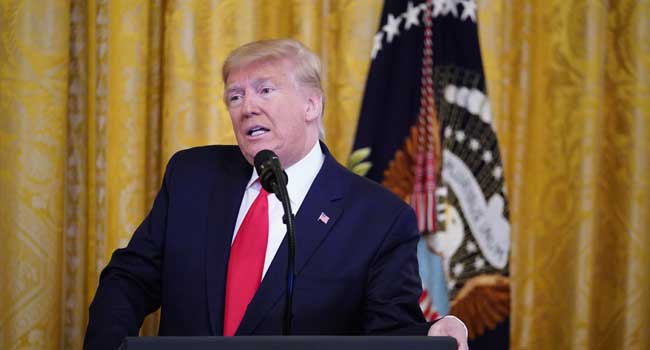Trump Plans to Appeal Birthright Citizenship Ruling
US President Donald Trump announced Thursday that his government will appeal a federal judge’s decision that temporarily halted his attempt to restrict birthright citizenship.
When asked about the verdict by Washington state District Judge John Coughenour, who stated that the president’s order was “blatantly unconstitutional,” Trump replied, “Obviously we will appeal it.”
On Thursday, a federal judge temporarily blocked Trump’s attempt to restrict birthright citizenship.
The decision sets a 14-day hold on one of Trump’s most contentious executive orders, which he issued shortly after being ushered into office for a second term.”This is a blatantly unconstitutional order,” US District Judge John Coughenour is alleged to have said during the hearing in Washington state.
“I’ve been on the bench for over four decades, and I can’t remember another case where the question presented is as clear as this one is,” said Coughenour, who was appointed by Republican President Ronald Reagan.
Trump told reporters that his administration would “obviously” appeal the decision, while the Justice Department said it would defend the executive order, which a spokesman claimed “correctly interprets” the US Constitution.
“We look forward to presenting a full merits argument to the Court and to the American people, who are desperate to see our Nation’s laws enforced,” a spokesperson stated.
The 14th Amendment of the United States Constitution guarantees birthright citizenship to anybody born on US soil.
It provides the following information: “All persons born or naturalised in the United States, and subject to the jurisdiction thereof, are citizens of the United States and of the State wherein they reside.”
Trump’s decision was based on the notion that anyone in the US illegally or on a visa was not “subject to the jurisdiction” of the country and so excluded from this group.
An astounded Coughenour chastised Justice Department attorney Brett Shumate for claiming that Trump’s order was constitutional.
“Frankly, I have difficulty understanding how a member of the bar could state unequivocally that this is a constitutional order,” he said.
“It just boggles my mind.”
‘On a whim’ –
The verdict follows a rush of lawsuits filed by 22 states, two towns, and numerous civil rights organisations.
It was praised by states that took part in the legal proceedings.
“No president can change the constitution on a whim, and today’s decision affirms that,” Arizona Attorney General Kris Mayes said.
The court verdict will be “the first of many wins to come as my office fights instances of executive overreach and any illegal actions the new administration may take.”
Washington Attorney General Nick Brown described Trump’s order as “un-American.”
“Birthright citizenship makes clear that citizenship cannot be conditioned on one’s race, ethnicity or where their parents came from,” he stated after the court’s decision.
“It’s the law of our nation, recognised by generations of jurists, lawmakers and presidents, until President Trump’s illegal action.”
The court challenge came as no surprise; Trump knew it was inevitable when he signed the order.
He has repeatedly — and incorrectly — claimed that the United States is the only country in the world having birthright citizenship; in fact, over 30 other countries, including Canada and Mexico, have it.
Trump’s opponents have maintained that the 14th Amendment, passed in 1868 as the United States attempted to rebuild itself following the Civil War, has been established law for more than a century.
They cited a US Supreme Court decision from 1898 in the case of Wong Kim Ark, a Chinese American born in San Francisco.
Wong was denied entry into the United States after visiting relatives in China because he was not a citizen.
The court ruled that children born in the United States, including those born to immigrants, cannot be refused citizenship.




